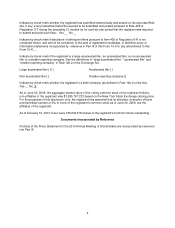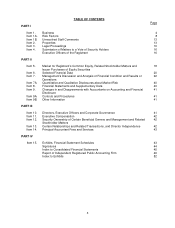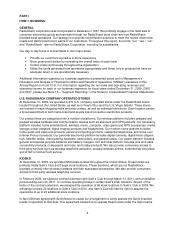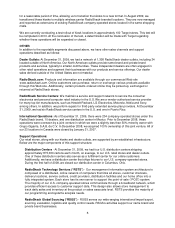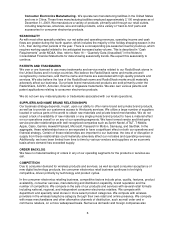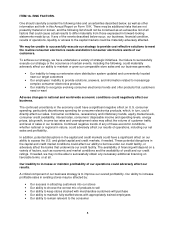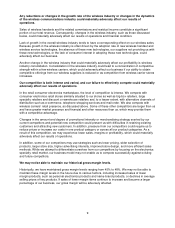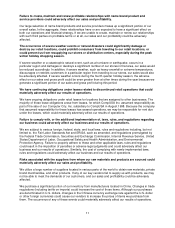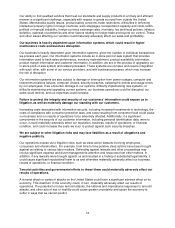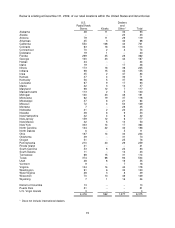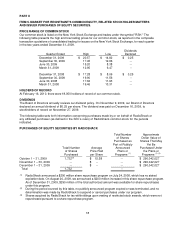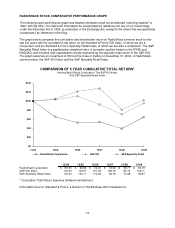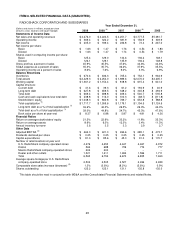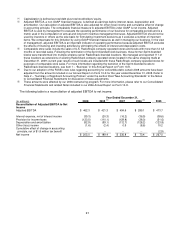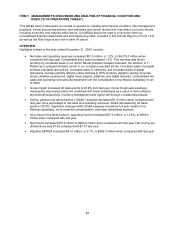Radio Shack 2009 Annual Report Download - page 19
Download and view the complete annual report
Please find page 19 of the 2009 Radio Shack annual report below. You can navigate through the pages in the report by either clicking on the pages listed below, or by using the keyword search tool below to find specific information within the annual report.12
Our ability to find qualified vendors that meet our standards and supply products in a timely and efficient
manner is a significant challenge, especially with respect to goods sourced from outside the United
States. Merchandise quality issues, product safety concerns, trade restrictions, difficulties in enforcing
intellectual property rights in foreign countries, work stoppages, transportation capacity and costs, tariffs,
political or financial instability, foreign currency exchange rates, monetary, tax and fiscal policies, inflation,
deflation, outbreak of pandemics and other factors relating to foreign trade are beyond our control. These
and other issues affecting our vendors could materially adversely affect our sales and profitability.
Our business is heavily dependent upon information systems, which could result in higher
maintenance costs and business disruption.
Our business is heavily dependent upon information systems, given the number of individual transactions
we process each year. Our information systems include an in-store point-of-sale system that provides
information used to track sales performance, inventory replenishment, product availability information,
product margin information and customer information. In addition, we are in the process of upgrading our
in-store point-of-sale system and related processes. These systems are complex and require integration
with each other, with some of our service providers, and with business processes, which may increase
the risk of disruption.
Our information systems are also subject to damage or interruption from power outages, computer and
telecommunications failures, computer viruses, security breaches, catastrophic events and usage errors
by our employees. If we encounter damage to our systems, difficulty implementing new systems, or
difficulty maintaining and upgrading current systems, our business operations could be disrupted, our
sales could decline, and our expenses could increase.
Failure to protect the integrity and security of our customers’ information could expose us to
litigation, as well as materially damage our standing with our customers.
Increasing costs associated with information security, including increased investments in technology, the
costs of compliance with consumer protection laws, and costs resulting from consumer fraud could cause
our business and our results of operations to be adversely affected. Additionally, if a significant
compromise in the security of our customer information, including personal identification data, were to
occur, it could materially adversely affect our reputation, business, results of operations, or financial
condition, and could increase the costs we incur to protect against such security breaches.
We are subject to other litigation risks and may face liabilities as a result of allegations and
negative publicity.
Our operations expose us to litigation risks, such as class action lawsuits involving employees,
consumers and shareholders. For example, from time to time putative class actions have been brought
against us relating to various labor matters. Defending against lawsuits and other proceedings may
involve significant expense and divert management’s attention and resources from other matters. In
addition, if any lawsuits were brought against us and resulted in a finding of substantial legal liability, it
could cause significant reputational harm to us and otherwise materially adversely affect our business,
results of operations, or financial condition.
Terrorist activities and governmental efforts to thwart them could materially adversely affect our
results of operations.
A terrorist attack or series of attacks on the United States could have a significant adverse effect on its
economy. This downturn in the economy could, in turn, materially adversely affect our results of
operations. The potential for future terrorist attacks, the national and international responses to terrorist
attacks, and other acts of war or hostility could cause greater uncertainty and cause the economy to
suffer in ways that we cannot predict.


